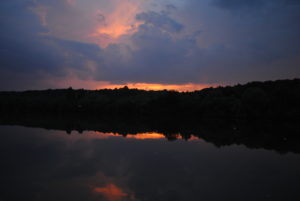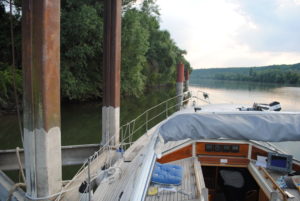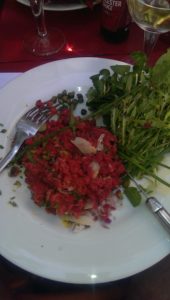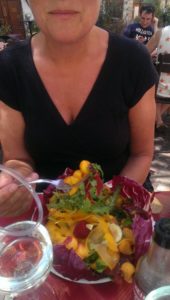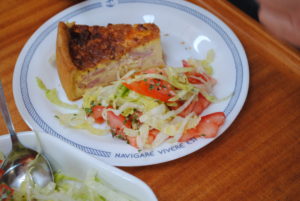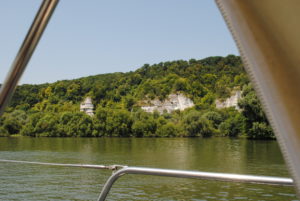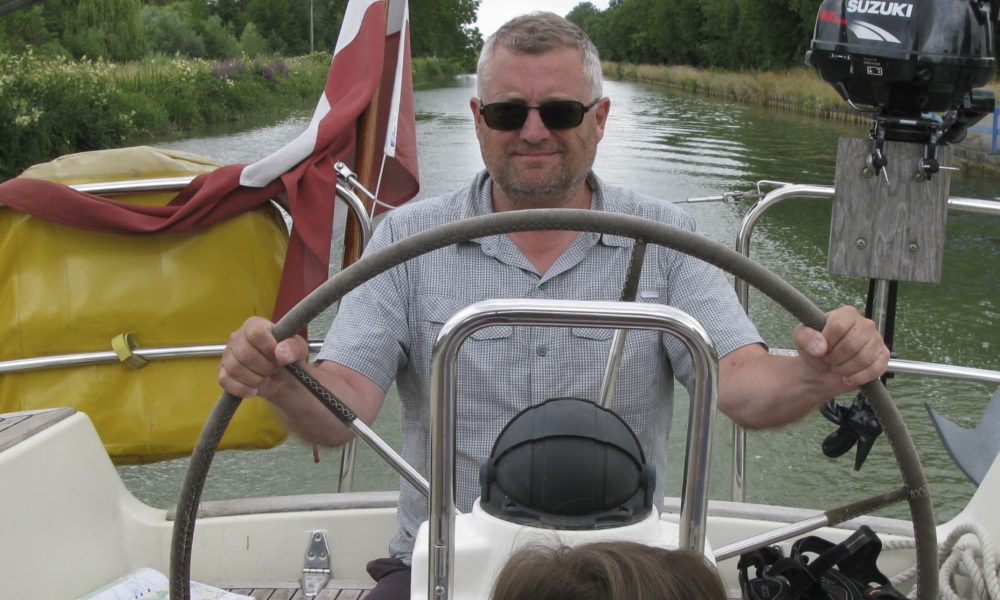
Arriving in Paris by boat at night is a marvellous experience
48° 58′ 49.8324” N 2° 2′ 12.2208” E
July 4. – 2014
We sail from Poissy-sous-Carriere at lunchtime. Henrik and Per has bought food in bulk. Huge. Two stuffed supermarket carts. 24 bottles of water, beer, wine, garbage bags, disposable tableware and food for many days. Meanwhile, Susanne and Kirsten have made the boat ready and scared a million spiders off the deck and from the cockpit.
We fill the tank with diesel, pay the port captain and say goodbye to him and his son with thanks for taking good care of Ronja through the winter. It cost 250 euros extra for oil, oil filters, and battery recharging. Well, it had cost the same in Denmark.
The port’s uncrowned king, Hans, get a new handful of canned beer and a hug from Kirsten. He looks like a happy man.
The trip to Paris is ok. We know the route in and out. For Susanne and Henrik it is an experience to try the locks for the first time and also to see Paris from the sea. The last – to see Paris from the sea on a Friday night – is a great experience for all of us.
Paris has just lost to Germany in the World Cup in Brazil. But it is not visible from the Parisians when we sail the last kilometres towards our destination, Port Arsenal. There’s a party along the Seine quay edges. Thousands of young people sitting in groups, smoking, drinking, eating, having fun, listening to music or dancing at the special dance places. It’s a beautiful experience to sail through Paris so late in the day. Party Ships. Holiday Atmosphere. Stuffed restaurants. Festively dressed Frenchmen. Great.
Log-book: Today’s distance: 80 km. Sailed time from 12.30 to 21.30 = 9 hours. Locks- 4 pcs. Weather: heavy and hot.
Locked out from our own boat
48° 58′ 49.8324” N 2° 2′ 12.2208” E
July 3. – 2014
Damn! Damn! Damn! Here we have driven 1220 km since 5:00 am this morning to arrive at the port of Poissy-sous-
Carriere at 21.00 – the port captain has promised us, that if we get there before 21:00, he will be at the port, so we can get the key to Ronja.
It’s only 20:00. We are knocking on his door. Locked. He has gone home. Only he has the key to Ronja. Damn!
We find another boss, King Hans, who from his motorboat keeps an eye on everyone, who come and go in the harbour. He is a bit eccentric and lives alone on his boat year round. We know him from last summer when we were immediately hailed from his boat, “No, You cannot be here, you have to get away! And You cannot lie there either.”
We melted his heart with a summer surplus stock of beer and soft drinks, which we gave him before we went home to Denmark and asked him to pay particular attention to Ronja through the winter.
King Hans was touched by the reunion. He assured us with sign language – pointed first at his eyes and then Ronja – that he had kept a sharp eye on our boat, and that Ronja was well. He is virtually impossible to communicate with, but he understands our problem anyway and tries immediately to find someone, who knows where the port captain is.
The captain himself has gone home. King Hans assures us that the captain’s son will come to the port in about twenty minutes and find the keys for us.
Everything is good.
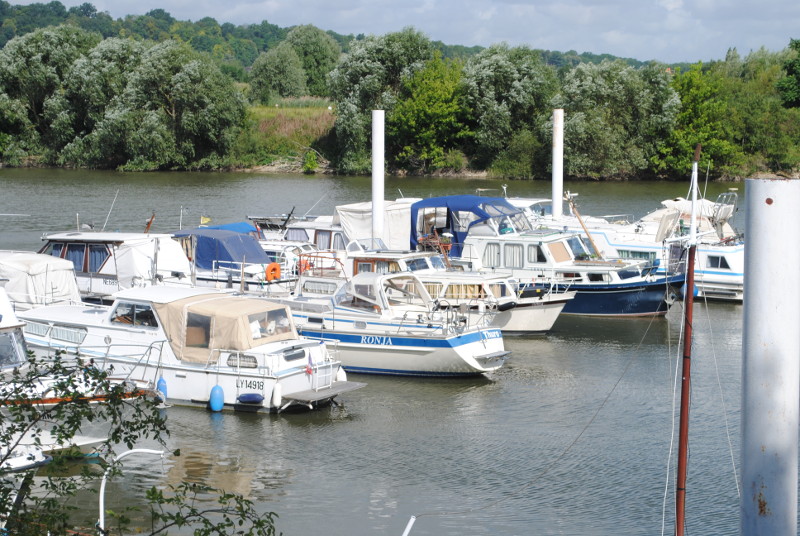
Here Ronja will stay over the winter 2013 to 2014
48° 51′ 3.9636” N 2° 22′ 4.6992” E
July 28. – 2013
In the late afternoon we call at Port St-Louis after a beautiful sailing through Paris and the northern suburbs.

Hanne and Per agree on a contract with the port captain. One years lease of berth in the harbour, supervised boat and help to winterize Ronja – a total of 1,890 Euros or 14,000 Danish kroner. This may sound expensive, but it’s still cheaper than having the boat lie on Thurø in Denmark.
The agreement is, that Per will write in English to the port captain’s son explaining what we want to have done about the boat when winter approaches – oil change, oil filter change, frost protection of water pipes, check the hot water heater and possibly charge the batteries.
The port captain is something of a pocket philosophical chatterbox, we get to hear about his Italian childhood and the difference between nordic values and southern European values. People in the north have lived hard lives. They have no time to talk. They get right to the point, says the harbour master. People in the South are more into each other, and establish a relationship before they reach the matter itself. He is obviously disappointed, that we do not want to talk about the advantages and disadvantages of different forms of contract length, while Per just makes it clear that he only wants a contract of one year.
Port St-Louis is a somewhat worn port, the boats in the harbour are also worn, and the toilet facilities are not something to write about.
We are located in an industrial area, with large ghetto settlements populated by immigrants. Poissy is the hometown of the Peugeot factories. Yet we believe that Ronja has found a good winter home. Kirsten is charming the port’s self-appointed lawman – the other port residents call him Rambo, his real name i Hans – who lives all year in his boat just two berths from ours. We give him the remaining stock of beer and soft drinks from the refrigerator and keep our fingers crossed, that he too will keep a close eye on Ronja.
Log-book: Sailed distance: 81 km or 40 miles. Time: departs at 9:30 am. Paying in Arsenal harbour. At five o’clock, we are – again – at Port St-Louis. Crew: George, Hanne, Kirsten and Per. Weather: Still growing hot. The cockpit tent is up most of the trip in order to provide a little shade.
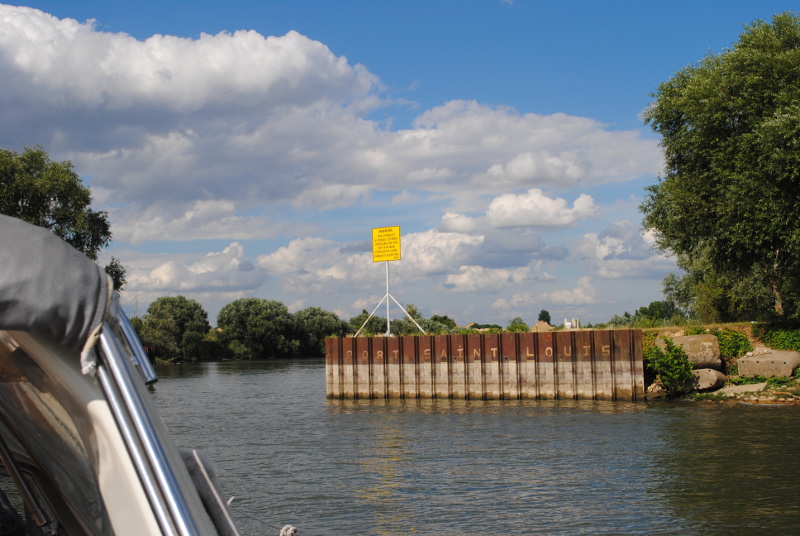
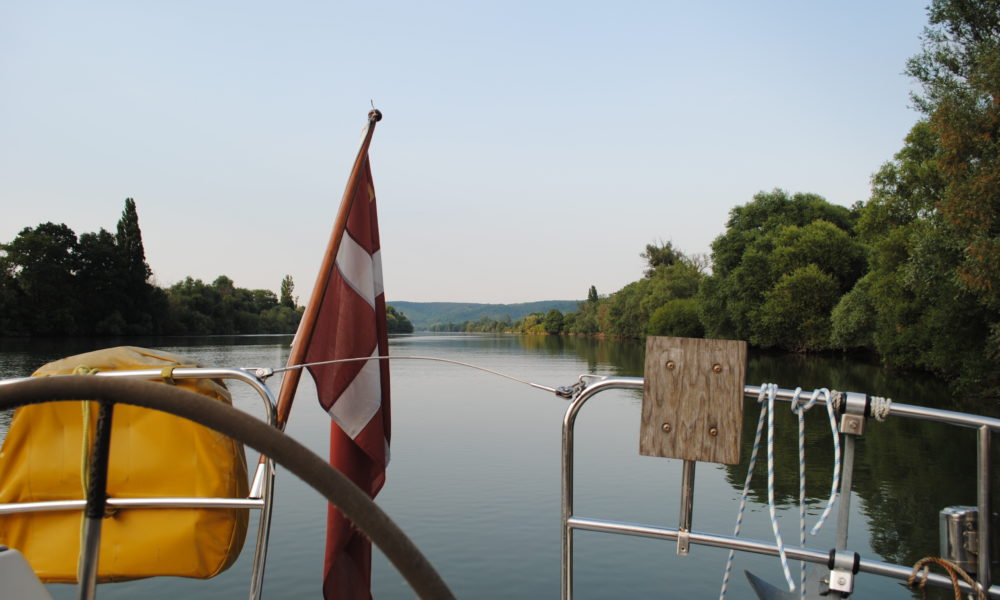
“Get away! Not even I am allowed to moore there!«
49° 26′ 35.6352” N 1° 5′ 59.8956” E
July 21. – 2013
We say goodbye to Monsieur Eric. We say goodbye to the French couple, who are staying in Rouen for another three days while they get their mast put on again, and we seek our one hundred percent French-speaking friend at Lamanage, because we are in search of two pieces of fender boards. At first he is unable to understand one bit. He believes we are in search of a kind of trestle where we can chock Ronjas boom up. Only slowly he understands the fumbling nature of our handling of the French language. “Oh, You want another board,” he says, pointing at the board, we have already stolen at his harbour area.
He takes us in search of a stack of wood and pallets. We find some old, great boards and point where we would like to have holes in the board, which is hard to explain, when you do not remember the French word for hole. Finally we succed. Per offers him 10 Euro as thanks for his help. But he refuses. And we thank him the more verbally with our still somewhat rusty French.
We sail for almost eight hours on an increasingly abandoned Seine. Beautiful. Desolate and largely without moorings. The rule in France is that yachts may not sail later than half an hour before sunset. So we must seize the opportunities that arise.
In the town of Les Andelys we hope to have some luck. They have no ports. But we bet on a particular jetty for river cruising ships. There are no cruise ships at the moment. So we think it will work? It does not. A French person from a riverboat nearby stands up and shouts. “Get away! Not even I am allowed to moore there!« We understand only a little of his tirade and an attempt to get him to indicate where else we can moor, gives no result.
We drift further up the Seine River looking for an anchorage for the night.
Damn Frenchmen. They are apparently still dismissive toward strangers. We have read that French people working in the hospitality industry are sent on courses to learn something new: Being friendly and service-minded towards strangers. Surveys have been shown, that foreigners generally perceive French as arrogant and condescending. And that image the French government wants to do something about. But our aggressive and vociferous friend in Les Andelys probably does not work in the hospitality industry.
Some kilometres further up the river we find a bulwark intended for barges ten times as long as ourselves. We make Ronja firm to the bullwark, and again we find that we’ve got a great place with sunset, birdsong and peace for another wonderful evening meal.
The river map says that there are another 168 kilometres to Paris.
Log-book: Sailed distance: 33 miles. Time: We leave at 12 o’clock after having stowed the sails and bicycles and garden bunkered diesel, which in these parts is in entirety Gasole. Weather: Magnificently hot. Hot in the morning and up to 34 degrees at seven o’clock in the evening. Perhaps we should go back home to more humane temperatures?
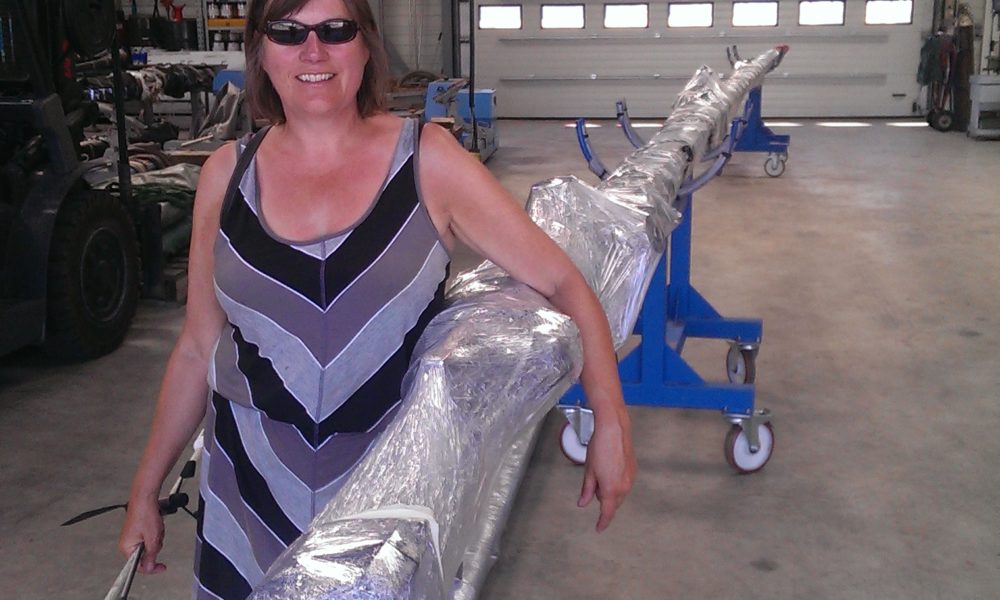
Britons: The french can’t do anything right
49° 26′ 35.6352” N 1° 5′ 59.8956” E
July 20. – 2013
We go to the warehouse at Lamanage. We remove the horns, the defect windpointer, the VHF antenna and the backstay, which is too long to be in the german lorry. We pack the mast in plastic and tape. The same with the boom and kickingstrap. Inside the plastic we place a “sign” with the name “Ronja” and Pers’ contact data.
Here you are. Mast and boom are ready to be transported to the Mediterranean. Per writes in the evening to Wolfgang Graf, that now we are ready with our part of the bargain. The rest is up to him.
Out in the streets again with our electric bikes. It is a great invention. We ride around Rouen for five hours. We see churches and churches and churches. We see old neighbourhoods with original buildings from not just the last century, but previous also. We hurtle away. Uphill. Downhill. Through the pedestrian streets. Electric bikes “rule the world.”
Along the way we find a great lunch restaurant, as French as it can be. Per has a mountain of tartar steak with an egg yolk in the middle and all sorts of condiments to mix with – capers, onions, chives, parsley, tabasco sauce, Worchester sauce. Kirsten gets the best ever salad with cheese and lots of exotic fruits. The absolute best meal we have had in a restaurant during this year’s world tour.
We cycle on. Going into L’Eclerc. A mammoth supermarket as only the French can make them. We buy Quiche Lorraine, ham, cheese and baguette. France, with daytime temperatures of 30 degrees is not great for hot dishes. Rather a small cold thing. Morning, noon and night.
French dislike cyclists. Everything is organised on cardrivers’ premises, and cyclists are fair game. They drive close to us. They cut in front of us. It’s all quite different from our experiences in the Netherlands, where cyclists are abundant and are largely a group of road users who are shown respect.
Back in the marina, it grows hot. We eat and talk a little with our British neighbours in a 39 foot and three story high motorboat. Fred and Margaret. We invite them to a glass of “Chateauneuf du Pape“. “Whauu“, they say. “We are British and normally drink only wine at three euros the bottle.”
They are pleasant to speak with. In fact, they are more normal people than sailors. They had run a construction company, and as the crisis started – they had left it to their son, and having receded, they needed something else to happen. They are like the French in the third boat, eager to pass on their experience of sailing in France. “It’s not about finding a good place to stay on the Seine. It is solely about finding a place,” they say.
There is not much that really works for the French, according to the two Britons. “No, the Dutch have much more control over their things,” they think after having also sailed part of the Netherlands over many years. They live twenty kilometres outside of London, and have their boat lying in Ipswich.
The greatest experience on their actual trip was a visit to Monet’s garden. Visit it. It is fantastic. Otherwise, they are most concerned with their criticism of the French, who can not find out how to do anything right. Later in the evening we move onto their boat and get British coffee – weak “but better than the French, who’s is so strong that the spoon is standing in the coffee” – and cookies. Cosy people. But probably more to gardens than boats.
The British give us their own list of accommodations along the Seine with a lot of handwritten comments on the individual sites.
Today’s harbour master, responsible for the three foreign guests, is Monsieur Eric. He is a person of helpfulness. When we come back from town after unsuccessfully trying to purchase a VNF vignette for sailing on the French rivers and channels, Monsieur Eric helps us to buy a vignette over the internet and print it out, so we can place it visible on the boat. A French keyboard is very different from a Danish keyboard, so it takes some time to get the application complete and the vignette printed out. But we succeed. We are seriously ready to channel navigation.
Same Monsieur Eric is strongly upset about the fact, that we want to leave his wonderful city after only two nights. “You come here, but You do not want to seriously learn about our city?” Tonight the church for example, is illuminated. We tell him about the five-hour bike ride, fatigue and the desire to come to Paris and meet our granddaughter in a few days. He does not understand.
Logbog: Sailed distance: 0.0 miles. Time: We stay the day in Rouen’s marina. Weather: Insanely hot. Hot in the morning, and 31 degrees at six o’clock at night.
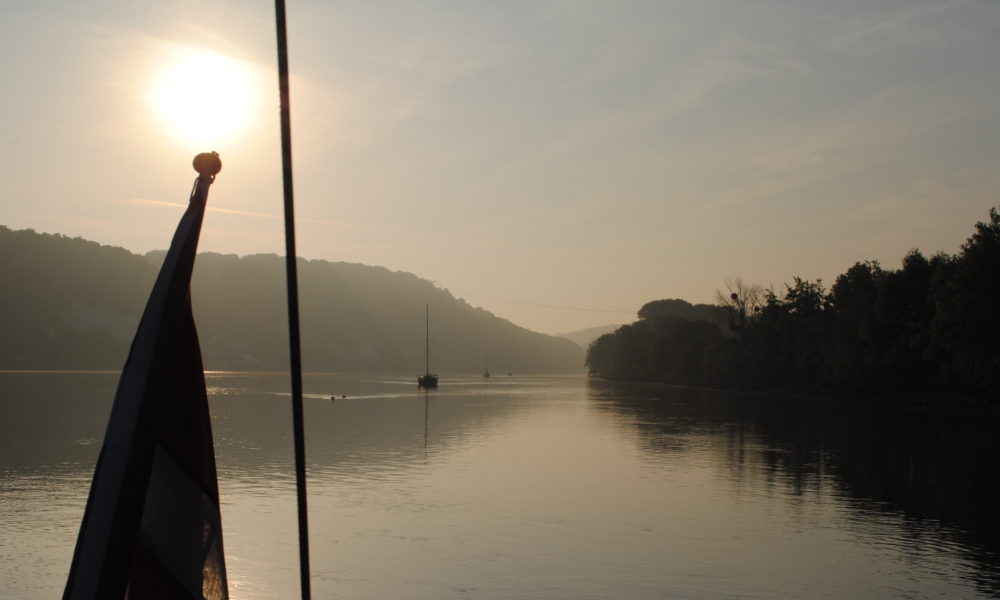
Tidal Seine is rough, desolate and magnificent nature
49° 29′ 39.732” N 0° 6′ 28.5444” E
July 18. – 2013
We had already asked for advice at the port office. “Go at low tide minus two hours,” they told us. Low tide in Le Havre on July 18 is 13.22. Minus two hours is 11.22. As a precaution, we leave at 11.15. It gave us the time for a quiet morning with a long run along the seafront in Le Havre, bath and breakfast.
The two hours before low tide, we use at getting to the entrance of the Seine. In the river there are some scary areas with shallow water, and it was explained to us, that they move from year to year, so as a precaution we have to sail far out into the English Channel before we swing into the entrance to Seine.
It turns out that there are two factors working against us. Today it is neaps. This happens once a month and means that the tidal current is less strong than normal – and therefore we get less co-current flow. At the same time, the wind is strong – 9-11 metres per second – and it slows our speed, as the wind mostly goes against us.
Therefore, we are not reaching today’s goal, Rouen, but have to moor Ronja to an anchor buoy some 15 nautical miles before Rouen as the tidal power is strong, and it becomes impossible to reach our goal within a half hour before sunset, which is the limit for boating on the Seine . We tie up to a very beautiful place.
Deciduous trees are all along the riverbank. Direct view of the sunset. Pies, bread and cheese provide an excellent evening meal at about nine.
The part of the Seine, which is called the “tidal Seine” is very special. Far more deserted than we had expected. Raw and steep nature. Not a single house has a boat in the front yard, which we have become accustomed to in Holland. In one day we come across less than a handful of boats like ours but maybe a dozen cargo ships. Beautiful scenery alternates with stinking industrial areas. When we are doing the best we log 9.5 knots. But for long periods we have – because of neaps and headwinds – difficulty to exceed six knots.
The special feature of the 120 kilometres along the Seine up to Rouen is also, that there are practically no places where you can dock or go to port. The back of the Seine estuary is the town of Honfleur. But then follows more than 50 miles without a single port or anchorage. Deserted. It is a pure coincidence that we find a private anchor buoy, which is free and we have no qualms spending our night in a small town called Duclair.
Log-book: Sailed distance: Close to 60 nautical miles. Time: Departure 11.15 from Le Havre. Arrival 20:30 in Duclair. Weather: Wind up to 11 meters per second from the NNE.
